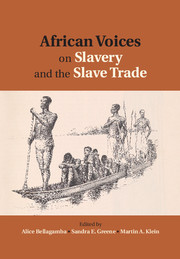41 results
Index
-
- Book:
- African Voices on Slavery and the Slave Trade
- Published online:
- 05 March 2016
- Print publication:
- 14 April 2016, pp 198-206
-
- Chapter
- Export citation
Copyright page
-
- Book:
- African Voices on Slavery and the Slave Trade
- Published online:
- 05 March 2016
- Print publication:
- 14 April 2016, pp iv-iv
-
- Chapter
- Export citation
Acknowledgements
-
- Book:
- African Voices on Slavery and the Slave Trade
- Published online:
- 05 March 2016
- Print publication:
- 14 April 2016, pp ix-x
-
- Chapter
- Export citation
8 - Yesterday and today
-
-
- Book:
- African Voices on Slavery and the Slave Trade
- Published online:
- 05 March 2016
- Print publication:
- 14 April 2016, pp 174-197
-
- Chapter
- Export citation
Contents
-
- Book:
- African Voices on Slavery and the Slave Trade
- Published online:
- 05 March 2016
- Print publication:
- 14 April 2016, pp v-v
-
- Chapter
- Export citation
Contributors
-
- Book:
- African Voices on Slavery and the Slave Trade
- Published online:
- 05 March 2016
- Print publication:
- 14 April 2016, pp vii-viii
-
- Chapter
- Export citation
Figures
-
- Book:
- African Voices on Slavery and the Slave Trade
- Published online:
- 05 March 2016
- Print publication:
- 14 April 2016, pp vi-vi
-
- Chapter
- Export citation
Introduction - Sources and methods
-
-
- Book:
- African Voices on Slavery and the Slave Trade
- Published online:
- 05 March 2016
- Print publication:
- 14 April 2016, pp 1-14
-
- Chapter
- Export citation

African Voices on Slavery and the Slave Trade
-
- Published online:
- 05 March 2016
- Print publication:
- 14 April 2016
Part Two - The Verbal Arts and Everyday Objects
-
- Book:
- African Voices on Slavery and the Slave Trade
- Published online:
- 05 April 2013
- Print publication:
- 13 May 2013, pp 115-178
-
- Chapter
- Export citation
Figures
-
- Book:
- African Voices on Slavery and the Slave Trade
- Published online:
- 05 April 2013
- Print publication:
- 13 May 2013, pp ix-x
-
- Chapter
- Export citation
45 - Introduction:
- from Part Nine - Living with the Past
-
- Book:
- African Voices on Slavery and the Slave Trade
- Published online:
- 05 April 2013
- Print publication:
- 13 May 2013, pp 521-521
-
- Chapter
- Export citation
Introduction - Finding the African Voice
-
-
- Book:
- African Voices on Slavery and the Slave Trade
- Published online:
- 05 April 2013
- Print publication:
- 13 May 2013, pp 1-8
-
- Chapter
- Export citation
Part Six - Legal Records
-
- Book:
- African Voices on Slavery and the Slave Trade
- Published online:
- 05 April 2013
- Print publication:
- 13 May 2013, pp 331-414
-
- Chapter
- Export citation
Contributors
-
-
- Book:
- African Voices on Slavery and the Slave Trade
- Published online:
- 05 April 2013
- Print publication:
- 13 May 2013, pp xi-xvi
-
- Chapter
- Export citation
19 - Introduction:
- from Part Four - Slavery Observed: European Travelers’ Accounts
-
- Book:
- African Voices on Slavery and the Slave Trade
- Published online:
- 05 April 2013
- Print publication:
- 13 May 2013, pp 213-213
-
- Chapter
- Export citation
3 - “The Little Things that Would Please Your Heart...”
- from Part One - Remembering Slavery and the Slave Trade
-
-
- Book:
- African Voices on Slavery and the Slave Trade
- Published online:
- 05 April 2013
- Print publication:
- 13 May 2013, pp 29-46
-
- Chapter
- Export citation
African Voices on Slavery and the Slave Trade - Title page
-
-
- Book:
- African Voices on Slavery and the Slave Trade
- Published online:
- 05 April 2013
- Print publication:
- 13 May 2013, pp iii-iii
-
- Chapter
- Export citation
Part Four - Slavery Observed: European Travelers’ Accounts
-
- Book:
- African Voices on Slavery and the Slave Trade
- Published online:
- 05 April 2013
- Print publication:
- 13 May 2013, pp 211-262
-
- Chapter
- Export citation
Part Three - Documenting Our Own Histories and Cultural Practices
-
- Book:
- African Voices on Slavery and the Slave Trade
- Published online:
- 05 April 2013
- Print publication:
- 13 May 2013, pp 179-210
-
- Chapter
- Export citation



